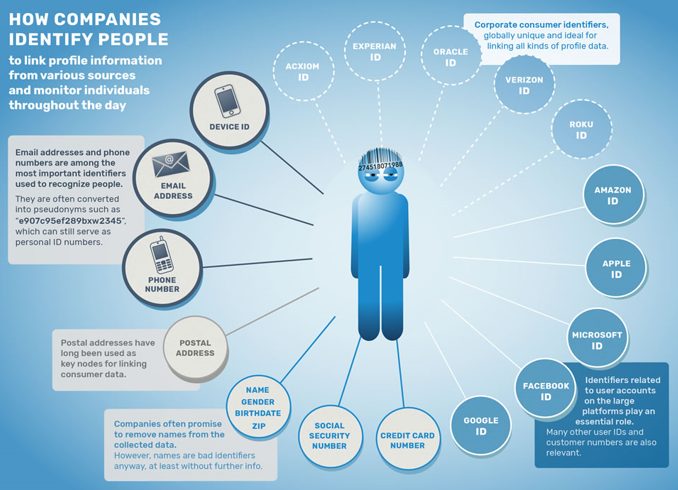Phone addiction & online profiling: A modern behavioural problem? (part 2)
In part two of this series on phone addiction, Jethro Goodchild highlights the way phones are feeding the human need for attention and the changing nature of social interaction and moral codes.
My previous thought piece raised the idea that screens are creating a much larger number of decisions for us to make, leading to decision fatigue, with some serious side effects. Furthermore, every screen is screaming for our attention with colours to stimulate our brain, special white light to keep us awake, tones to catch our ear and constant notifications and advertisements to distract us.
Here I discuss the fundamental human need that is being increasingly satisfied by screens. Phones, the main screen, quench a human thirst for attention because they make us feel important and wanted. Furthermore, that attention is so accessible. Despite how frustrating all those emails and messages can be, in a sub-conscious way it is extremely gratifying and flattering as humans like the attention. All that attention is addictive.
Just take a look around you, almost everyone has their face buried in a phone. CNN World reported “As rates of smartphone addiction rise, so too do the adverse effects on our brains.”[i] A study from South Korea[ii] on the brains of teenagers with smartphone addiction demonstrated their susceptibility to “depression, anxiety, insomnia and impulsivity.” The adverse impact of behavioural addiction on our mental and physical health is becoming clearer.
France has banned the use of screens in schools. “We know today that there is a phenomenon of screen addiction, the phenomenon of bad mobile phone use”, was a comment from the French education minister. Another study by the London School of Economics showed that banning smartphones in schools caused a clear improvement in students’ test scores[iii]. Phones are inhibiting our ability to learn.
As actuaries with fidicuary responsibilities how can we ensure that we are designing products which meet the complex financial needs of our customers yet also sell to a generation that are increasingly using quick and instinctive ways to make their decisions?
The phone has become a universal access device and a primary source for humans to communicate and receive attention. Question: are we truly happy with the attention we are getting or does the addiction just keep us searching? Kaptein refers to this behavioural problem, “we live in our own bubbles. Our bubbles however are not created based on our interest, but rather based on our click behavior.”[iv] Do we get the validation and recognition we are looking for or are smartphones just making us feel emptier?
Why do people pick up their phone as you enter a lift? Is it to do some urgent work they just remembered? People are pursuing a sub-conscious comfort and need in their phone. Even the appearance of a stranger in a lift can make us reach for that safety net. Our desire for attention and validation is a normal and powerful human pursuit but is your screen and social media really satisfying that need?
Can insurance companies keep up with the most cutting edge tech companies who are finding new and innovative ways to feed our phone addictions? Some behavioural addiction techniques used by companies online include reward scheduling and positive reinforcement. These techniques get you addicted to the “free” or low cost convenience/activities then they slowly increase their charges or simply bombard you with targeted advertising. They are all profit driven businesses after all. Online gaming, Facebook, Uber and Deliveroo have all used variations of these techniques.
For the millennial generation (and the next) screens have always been there. In fact they live in a screen driven world where screens are the real life and anything not connected to it feels unreal. Instead of looking for friends or communication in places like the playground, sports field or through the family network, now friends, interaction, compliments, likes, “conversation” and even “love” are found online. It is definitely more efficient than those old methods of finding attention, it is 24hrs a day, so convenient and it’s global. Access to attention is now unlimited but is it all good?
Does anyone have a friend or friends that are so inaccessible in real life but so accessible online ? Have any of these friends gone suddenly from everything to nothing? There is no commitment online since it is easier to hide behind a screen than to face someone physically. It is easy to behave without a conscience since relationships can be less genuine and it is so easy to disappear. Moral code is different on screens.
? Have any of these friends gone suddenly from everything to nothing? There is no commitment online since it is easier to hide behind a screen than to face someone physically. It is easy to behave without a conscience since relationships can be less genuine and it is so easy to disappear. Moral code is different on screens.
Is online behavior always online these days? As your online world starts to dominate then so too does the type of behavior it encourages. The behaviour it encourages becomes so common that it becomes normal and influences offline too. In previous generations our offline behavior dominated, it had real substance, now online behaviour seems to be dominating offline behaviour too. Online moral code is invading real life.
As part of generation X, I ask myself how did this happen? Technology has made our lives easier and more efficient so where have our friendships gone and the spare time to spend on them and foster them? In my view, for all the massive improvements in efficiency and productivity that computers have given us, it is largely offset by the infinite number of distractions and time spent on photo viewing and “socializing” online. A smaller number of deep and long lasting friendships is being overtaken by unlimited access to new friendships and attention. The human desire for gratification and attention is very strong along with the natural tendency to find the easiest way to get it.
Unfortunately screen friendships are often superficial, screens prey on our insecurities and screens force us to compare our visual selves. Unfortunately, constructive criticism also disappears online or is ignored, there is only a “Like” button and never a “Dislike”. Flattery on a screen is simple and quick, unfortunately it is also given superficially so the joy is also shallow. Is this screen addiction creating a generation that can’t handle criticism and don’t experience real emotional commitment? Surely true love and happiness, the gift of human touch, eye contact and sincerity will never be matched by a screen. The human desire for attention will never be truly satisfied by a screen.

With all that screen addiction, what about the deeper impact that marketing agencies are using to persuade and influence us? Kaptein says “Persuasion profiles will likely be combined with behavioural targeting to make sure you are pitched the right product in the right way”. Companies are using big data, consumer online behavior and profiling to feed our phone addictions, feed you products you don’t need and persuade you to buy. Every mouse click you make, everything you buy or download, even the speed and location of your mouse pointer is being analysed by companies in order to profile you. Customised screen advertising based on personal profiles, credit assessments based on digital behavioural data and predicting health based on consumer data are just a few examples.[v] Addiction to screens only gives big business more data points in a shorter period of time to analyse and profile. Screen addiction is making us vulnerable to profiling.
Insurance companies are also in the big data race to better understand their customer’s behaviours. Creating an addiction or at least a perceived need, is an important part of that data challenge. Actuaries and insurance companies need to be thinking very seriously about how can we use our data in the most predictive and profitable way yet maintain our fiduciary responsibilities?
As discussed in my first thought piece, I believe System 1 thinking (the quick and instinctive type) is being catalyzed by the internet. Cialdini refers to this as a “click zoom response” where we make mental shortcuts and sub-conscious decisions. The internet is rock fuel for this kind of decision making. As Kaptein points out “People using system 1 are unconsciously persuaded”. System 1 thinking (and screen addiction) makes you more easy to profile and target as a customer and big business are using this knowledge to take advantage of consumers. As Kaptein further points out, “People don’t make decisions just to optimize their utility. People often show click-zoom reactions. Reactions that are based on mental short-cuts”. Online businesses are is taking advantage of our screen addictions.
As mentioned, this is both an opportunity and risk for actuaries and insurance companies. Life insurance and investment products by their very nature are complex and we run the risk of breaching the “best interest test” with our products if we over exploit the addictions and system 1 thinking of our customers. I think the millennial generation like to make complex decisions in smaller manageable size pieces. Gamification of decision making is one technique I have seen in a Robo Adviser to address this challenge. Online advisers need to gain access to System 2 complex thought and ensure customers are indeed making an informed decision about their financial needs and not an instinctive and addiction driven purchase.
In summary, there is a subtle but very clear change that is happening to human behaviour. Addiction to the screen is facilitating and catalyzing these changes. The addiction is feeding our relentless pursuit of attention which will rarely be satisfied online. Phones are encouraging us to live in a world where the moral compass is changing. The influence of screens is becoming so powerful that online behavior is dominating all forms of behaviour. The way we think and behave on screens is quick and instinctive and this makes us great targets for companies wanting to profile and profit from us. Insurance companies are grappling with this challenge whilst walking on the right side of fidicuary responsibility. Companies are realising online behavior is the new normal.
References:
CNN World: France bans smartphones from schools.
Kaptein: Persuasion Profiling, How the internet knows what makes you tick.
Cialdini: Influence: The Psychology of Persusasion.
Dobelli: The art of thinking clearly.
London School of Economics, Centre for Economic Performance: Ill Communication: Technology, Distraction and Student Performance.
Radiological Society of North America, Smartphone addiction creates imbalance in brain, 30 November 2017
Crackedlabs.org: Corporate surveillance in everyday life
[i] CNN World
[ii] Radiological Society of North America
[iii] London School of Economics
[iv] Kaptein
[v] crackedlabs.org
[vi] crackedlabs.org
CPD: Actuaries Institute Members can claim two CPD points for every hour of reading articles on Actuaries Digital.





